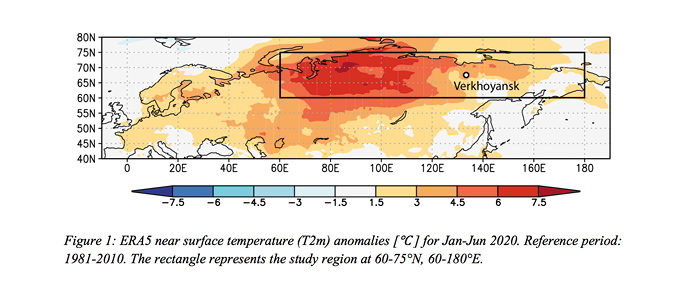According to the WMO, the recent prolonged Siberia heat from January to June 2020 would have been almost impossible without the influence of human-caused climate change, according to a rapid attribution analysis by a team of climate scientists.
The researchers from international universities and meteorological services from the Russian Federation, France, Germany, the Netherlands, Switzerland and the UK concluded that temperatures were likely more than 2°C hotter than they would have been if humans had not been releasing greenhouse gas emissions.
The WMO noted that temperatures in Siberia have been more than 5°C above average from January to June, and in June up to 10°C above average. This has contributed to the first half of the year being the second warmest on record for the region. A temperature of 38°C was recorded in the Russian town of Verkhoyansk on June 20. The WMO is set to verify whether this is a new record temperature north of the Arctic Circle and establish a corresponding new category in its Global Weather and Climate Extremes Archive.
To try and ascertain the effect of human-influenced climate change on these high temperatures, the scientists contributing to the World Weather Attribution (WWA) initiative ran computer simulations to compare the climate as it is today, with about 1°C of global warming, with the climate as it might have been without human influence, using the same methods as in past rapid and peer-reviewed studies.
“In many previous studies we have seen hot spells and heatwaves become hotter and more frequent around the world, consistent with our scientific understanding. In places such as Siberia, a hotter climate can have devastating effects, not just on the local wildlife and people who live there, but also on the world’s climate system as a whole, for example through thawing permafrost, reduced snow cover and melting ice,” said the World Weather Attribution scientists.
The WMO said the analysis showed that prolonged heat like Siberia experienced from January to June this year would likely only happen less than once in every 80,000 years without human-induced climate change – the claim being that this makes it almost impossible in a climate that had not been warmed by greenhouse gas emissions. Their analysis suggests that climate change increased the chances of the prolonged heat by a factor of at least 600. This is among the strongest results of any attribution study conducted to date and is being touted as unequivocal evidence of the influence of human-induced climate change on the planet.
The scientists noted that even in the current climate the prolonged heat was still unlikely – such extreme conditions can be expected to occur less than once every 130 years – but it maintains that without rapid cuts in greenhouse gas emissions they risk becoming frequent by the end of the century.



